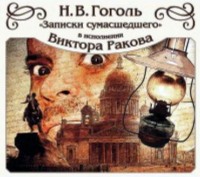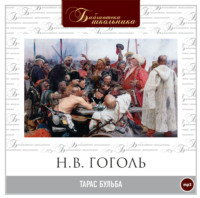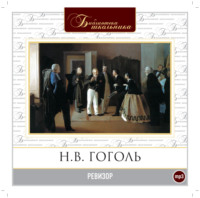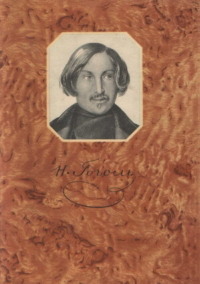 полная версия
полная версияTaras Bulba, and Other Tales
“Father, what have you done? Was it you who killed him?” said Ostap, coming up at this moment.
Taras nodded.
Ostap gazed intently at the dead man. He was sorry for his brother, and said at once: “Let us give him honourable burial, father, that the foe may not dishonour his body, nor the birds of prey rend it.”
“They will bury him without our help,” said Taras; “there will be plenty of mourners and rejoicers for him.”
And he reflected for a couple of minutes, whether he should fling him to the wolves for prey, or respect in him the bravery which every brave man is bound to honour in another, no matter whom? Then he saw Golopuitenko galloping towards them and crying: “Woe, hetman, the Lyakhs have been reinforced, a fresh force has come to their rescue!” Golopuitenko had not finished speaking when Vovtuzenko galloped up: “Woe, hetman! a fresh force is bearing down upon us.”
Vovtuzenko had not finished speaking when Pisarenko rushed up without his horse: “Where are you, father? The Cossacks are seeking for you. Hetman Nevelitchkiy is killed, Zadorozhniy is killed, and Tcherevitchenko: but the Cossacks stand their ground; they will not die without looking in your eyes; they want you to gaze upon them once more before the hour of death arrives.”
“To horse, Ostap!” said Taras, and hastened to find his Cossacks, to look once more upon them, and let them behold their hetman once more before the hour of death. But before they could emerge from the wood, the enemy’s force had already surrounded it on all sides, and horsemen armed with swords and spears appeared everywhere between the trees. “Ostap, Ostap! don’t yield!” shouted Taras, and grasping his sword he began to cut down all he encountered on every side. But six suddenly sprang upon Ostap. They did it in an unpropitious hour: the head of one flew off, another turned to flee, a spear pierced the ribs of a third; a fourth, more bold, bent his head to escape the bullet, and the bullet striking his horse’s breast, the maddened animal reared, fell back upon the earth, and crushed his rider under him. “Well done, son! Well done, Ostap!” cried Taras: “I am following you.” And he drove off those who attacked him. Taras hewed and fought, dealing blows at one after another, but still keeping his eye upon Ostap ahead. He saw that eight more were falling upon his son. “Ostap, Ostap! don’t yield!” But they had already overpowered Ostap; one had flung his lasso about his neck, and they had bound him, and were carrying him away. “Hey, Ostap, Ostap!” shouted Taras, forcing his way towards him, and cutting men down like cabbages to right and left. “Hey, Ostap, Ostap!” But something at that moment struck him like a heavy stone. All grew dim and confused before his eyes. In one moment there flashed confusedly before him heads, spears, smoke, the gleam of fire, tree-trunks, and leaves; and then he sank heavily to the earth like a felled oak, and darkness covered his eyes.
CHAPTER X
“I have slept a long while!” said Taras, coming to his senses, as if after a heavy drunken sleep, and trying to distinguish the objects about him. A terrible weakness overpowered his limbs. The walls and corners of a strange room were dimly visible before him. At length he perceived that Tovkatch was seated beside him, apparently listening to his every breath.
“Yes,” thought Tovkatch, “you might have slept forever.” But he said nothing, only shook his finger, and motioned him to be silent.
“But tell me where I am now?” asked Taras, straining his mind, and trying to recollect what had taken place.
“Be silent!” cried his companion sternly. “Why should you want to know? Don’t you see that you are all hacked to pieces? Here I have been galloping with you for two weeks without taking a breath; and you have been burnt up with fever and talking nonsense. This is the first time you have slept quietly. Be silent if you don’t wish to do yourself an injury.”
But Taras still tried to collect his thoughts and to recall what had passed. “Well, the Lyakhs must have surrounded and captured me. I had no chance of fighting my way clear from the throng.”
“Be silent, I tell you, you devil’s brat!” cried Tovkatch angrily, as a nurse, driven beyond her patience, cries out at her unruly charge. “What good will it do you to know how you got away? It is enough that you did get away. Some people were found who would not abandon you; let that be enough for you. It is something for me to have ridden all night with you. You think that you passed for a common Cossack? No, they have offered a reward of two thousand ducats for your head.”
“And Ostap!” cried Taras suddenly, and tried to rise; for all at once he recollected that Ostap had been seized and bound before his very eyes, and that he was now in the hands of the Lyakhs. Grief overpowered him. He pulled off and tore in pieces the bandages from his wounds, and threw them far from him; he tried to say something, but only articulated some incoherent words. Fever and delirium seized upon him afresh, and he uttered wild and incoherent speeches. Meanwhile his faithful comrade stood beside him, scolding and showering harsh, reproachful words upon him without stint. Finally, he seized him by the arms and legs, wrapped him up like a child, arranged all his bandages, rolled him in an ox-hide, bound him with bast, and, fastening him with ropes to his saddle, rode with him again at full speed along the road.
“I’ll get you there, even if it be not alive! I will not abandon your body for the Lyakhs to make merry over you, and cut your body in twain and fling it into the water. Let the eagle tear out your eyes if it must be so; but let it be our eagle of the steppe and not a Polish eagle, not one which has flown hither from Polish soil. I will bring you, though it be a corpse, to the Ukraine!”
Thus spoke his faithful companion. He rode without drawing rein, day and night, and brought Taras still insensible into the Zaporozhian Setch itself. There he undertook to cure him, with unswerving care, by the aid of herbs and liniments. He sought out a skilled Jewess, who made Taras drink various potions for a whole month, and at length he improved. Whether it was owing to the medicine or to his iron constitution gaining the upper hand, at all events, in six weeks he was on his feet. His wounds had closed, and only the scars of the sabre-cuts showed how deeply injured the old Cossack had been. But he was markedly sad and morose. Three deep wrinkles engraved themselves upon his brow and never more departed thence. Then he looked around him. All was new in the Setch; all his old companions were dead. Not one was left of those who had stood up for the right, for faith and brotherhood. And those who had gone forth with the Koschevoi in pursuit of the Tatars, they also had long since disappeared. All had perished. One had lost his head in battle; another had died for lack of food, amid the salt marshes of the Crimea; another had fallen in captivity and been unable to survive the disgrace. Their former Koschevoi was no longer living, nor any of his old companions, and the grass was growing over those once alert with power. He felt as one who had given a feast, a great noisy feast. All the dishes had been smashed in pieces; not a drop of wine was left anywhere; the guests and servants had all stolen valuable cups and platters; and he, like the master of the house, stood sadly thinking that it would have been no feast. In vain did they try to cheer Taras and to divert his mind; in vain did the long-bearded, grey-haired guitar-players come by twos and threes to glorify his Cossack deeds. He gazed grimly and indifferently at everything, with inappeasable grief printed on his stolid face; and said softly, as he drooped his head, “My son, my Ostap!”
The Zaporozhtzi assembled for a raid by sea. Two hundred boats were launched on the Dnieper, and Asia Minor saw those who manned them, with their shaven heads and long scalp-locks, devote her thriving shores to fire and sword; she saw the turbans of her Mahometan inhabitants strewn, like her innumerable flowers, over the blood-sprinkled fields, and floating along her river banks; she saw many tarry Zaporozhian trousers, and strong hands with black hunting-whips. The Zaporozhtzi ate up and laid waste all the vineyards. In the mosques they left heaps of dung. They used rich Persian shawls for sashes, and girded their dirty gaberdines with them. Long afterwards, short Zaporozhian pipes were found in those regions. They sailed merrily back. A ten-gun Turkish ship pursued them and scattered their skiffs, like birds, with a volley from its guns. A third part of them sank in the depths of the sea; but the rest again assembled, and gained the mouth of the Dnieper with twelve kegs full of sequins. But all this did not interest Taras. He went off upon the steppe as though to hunt; but the charge remained in his gun, and, laying down the weapon, he would seat himself sadly on the shores of the sea. He sat there long with drooping head, repeating continually, “My Ostap, my Ostap!” Before him spread the gleaming Black Sea; in the distant reeds the sea-gull screamed. His grey moustache turned to silver, and the tears fell one by one upon it.
At last Taras could endure it no longer. “Whatever happens, I must go and find out what he is doing. Is he alive, or in the grave? I will know, cost what it may!” Within a week he found himself in the city of Ouman, fully armed, and mounted, with lance, sword, canteen, pot of oatmeal, powder horn, cord to hobble his horse, and other equipments. He went straight to a dirty, ill-kept little house, the small windows of which were almost invisible, blackened as they were with some unknown dirt. The chimney was wrapped in rags; and the roof, which was full of holes, was covered with sparrows. A heap of all sorts of refuse lay before the very door. From the window peered the head of a Jewess, in a head-dress with discoloured pearls.
“Is your husband at home?” said Bulba, dismounting, and fastening his horse’s bridle to an iron hook beside the door.
“He is at home,” said the Jewess, and hastened out at once with a measure of corn for the horse, and a stoup of beer for the rider.
“Where is your Jew?”
“He is in the other room at prayer,” replied the Jewess, bowing and wishing Bulba good health as he raised the cup to his lips.
“Remain here, feed and water my horse, whilst I go speak with him alone. I have business with him.”
This Jew was the well-known Yankel. He was there as revenue-farmer and tavern-keeper. He had gradually got nearly all the neighbouring noblemen and gentlemen into his hands, had slowly sucked away most of their money, and had strongly impressed his presence on that locality. For a distance of three miles in all directions, not a single farm remained in a proper state. All were falling in ruins; all had been drunk away, and poverty and rags alone remained. The whole neighbourhood was depopulated, as if after a fire or an epidemic; and if Yankel had lived there ten years, he would probably have depopulated the Waiwode’s whole domains.
Taras entered the room. The Jew was praying, enveloped in his dirty shroud, and was turning to spit for the last time, according to the forms of his creed, when his eye suddenly lighted on Taras standing behind him. The first thing that crossed Yankel’s mind was the two thousand ducats offered for his visitor’s head; but he was ashamed of his avarice, and tried to stifle within him the eternal thought of gold, which twines, like a snake, about the soul of a Jew.
“Listen, Yankel,” said Taras to the Jew, who began to bow low before him, and as he spoke he shut the door so that they might not be seen, “I saved your life: the Zaporozhtzi would have torn you to pieces like a dog. Now it is your turn to do me a service.”
The Jew’s face clouded over a little.
“What service? If it is a service I can render, why should I not render it?”
“Ask no questions. Take me to Warsaw.”
“To Warsaw? Why to Warsaw?” said the Jew, and his brows and shoulders rose in amazement.
“Ask me nothing. Take me to Warsaw. I must see him once more at any cost, and say one word to him.”
“Say a word to whom?”
“To him—to Ostap—to my son.”
“Has not my lord heard that already—”
“I know, I know all. They offer two thousand ducats for my head. They know its value, fools! I will give you five thousand. Here are two thousand on the spot,” and Bulba poured out two thousand ducats from a leather purse, “and the rest when I return.”
The Jew instantly seized a towel and concealed the ducats under it. “Ai, glorious money! ai, good money!” he said, twirling one gold piece in his hand and testing it with his teeth. “I don’t believe the man from whom my lord took these fine gold pieces remained in the world an hour longer; he went straight to the river and drowned himself, after the loss of such magnificent gold pieces.”
“I should not have asked you, I might possibly have found my own way to Warsaw; but some one might recognise me, and then the cursed Lyakhs would capture me, for I am not clever at inventions; whilst that is just what you Jews are created for. You would deceive the very devil. You know every trick: that is why I have come to you; and, besides, I could do nothing of myself in Warsaw. Harness the horse to your waggon at once and take me.”
“And my lord thinks that I can take the nag at once, and harness him, and say ‘Get up, Dapple!’ My lord thinks that I can take him just as he is, without concealing him?”
“Well, hide me, hide me as you like: in an empty cask?”
“Ai, ai! and my lord thinks he can be concealed in an empty cask? Does not my lord know that every man thinks that every cast he sees contains brandy?”
“Well, let them think it is brandy.”
“Let them think it is brandy?” said the Jew, and grasped his ear-locks with both hands, and then raised them both on high.
“Well, why are you so frightened?”
“And does not my lord know that God has made brandy expressly for every one to sip? They are all gluttons and fond of dainties there: a nobleman will run five versts after a cask; he will make a hole in it, and as soon as he sees that nothing runs out, he will say, ‘A Jew does not carry empty casks; there is certainly something wrong. Seize the Jew, bind the Jew, take away all the Jew’s money, put the Jew in prison!’ Then all the vile people will fall upon the Jew, for every one takes a Jew for a dog; and they think he is not a man, but only a Jew.”
“Then put me in the waggon with some fish over me.”
“I cannot, my lord, by heaven, I cannot: all over Poland the people are as hungry as dogs now. They will steal the fish, and feel my lord.”
“Then take me in the fiend’s way, only take me.”
“Listen, listen, my lord!” said the Jew, turning up the ends of his sleeves, and approaching him with extended arms. “This is what we will do. They are building fortresses and castles everywhere: French engineers have come from Germany, and so a great deal of brick and stone is being carried over the roads. Let my lord lie down in the bottom of the waggon, and over him I will pile bricks. My lord is strong and well, apparently, so he will not mind if it is a little heavy; and I will make a hole in the bottom of the waggon in order to feed my lord.”
“Do what you will, only take me!”
In an hour, a waggon-load of bricks left Ouman, drawn by two sorry nags. On one of them sat tall Yankel, his long, curling ear-locks flowing from beneath his Jewish cap, as he bounced about on the horse, like a verst-mark planted by the roadside.
CHAPTER XI
At the time when these things took place, there were as yet on the frontiers neither custom-house officials nor guards—those bugbears of enterprising people—so that any one could bring across anything he fancied. If any one made a search or inspection, he did it chiefly for his own pleasure, especially if there happened to be in the waggon objects attractive to his eye, and if his own hand possessed a certain weight and power. But the bricks found no admirers, and they entered the principal gate unmolested. Bulba, in his narrow cage, could only hear the noise, the shouts of the driver, and nothing more. Yankel, bouncing up and down on his dust-covered nag, turned, after making several detours, into a dark, narrow street bearing the names of the Muddy and also of the Jews’ street, because Jews from nearly every part of Warsaw were to be found here. This street greatly resembled a back-yard turned wrong side out. The sun never seemed to shine into it. The black wooden houses, with numerous poles projecting from the windows, still further increased the darkness. Rarely did a brick wall gleam red among them; for these too, in many places, had turned quite black. Here and there, high up, a bit of stuccoed wall illumined by the sun glistened with intolerable whiteness. Pipes, rags, shells, broken and discarded tubs: every one flung whatever was useless to him into the street, thus affording the passer-by an opportunity of exercising all his five senses with the rubbish. A man on horseback could almost touch with his hand the poles thrown across the street from one house to another, upon which hung Jewish stockings, short trousers, and smoked geese. Sometimes a pretty little Hebrew face, adorned with discoloured pearls, peeped out of an old window. A group of little Jews, with torn and dirty garments and curly hair, screamed and rolled about in the dirt. A red-haired Jew, with freckles all over his face which made him look like a sparrow’s egg, gazed from a window. He addressed Yankel at once in his gibberish, and Yankel at once drove into a court-yard. Another Jew came along, halted, and entered into conversation. When Bulba finally emerged from beneath the bricks, he beheld three Jews talking with great warmth.
Yankel turned to him and said that everything possible would be done; that his Ostap was in the city jail, and that although it would be difficult to persuade the jailer, yet he hoped to arrange a meeting.
Bulba entered the room with the three Jews.
The Jews again began to talk among themselves in their incomprehensible tongue. Taras looked hard at each of them. Something seemed to have moved him deeply; over his rough and stolid countenance a flame of hope spread, of hope such as sometimes visits a man in the last depths of his despair; his aged heart began to beat violently as though he had been a youth.
“Listen, Jews!” said he, and there was a triumphant ring in his words. “You can do anything in the world, even extract things from the bottom of the sea; and it has long been a proverb, that a Jew will steal from himself if he takes a fancy to steal. Set my Ostap at liberty! give him a chance to escape from their diabolical hands. I promised this man five thousand ducats; I will add another five thousand: all that I have, rich cups, buried gold, houses, all, even to my last garment, I will part with; and I will enter into a contract with you for my whole life, to give you half of all the booty I may gain in war.”
“Oh, impossible, dear lord, it is impossible!” said Yankel with a sigh.
“Impossible,” said another Jew.
All three Jews looked at each other.
“We might try,” said the third, glancing timidly at the other two. “God may favour us.”
All three Jews discussed the matter in German. Bulba, in spite of his straining ears, could make nothing of it; he only caught the word “Mardokhai” often repeated.
“Listen, my lord!” said Yankel. “We must consult with a man such as there never was before in the world… ugh, ugh! as wise as Solomon; and if he will do nothing, then no one in the world can. Sit here: this is the key; admit no one.” The Jews went out into the street.
Taras locked the door, and looked out from the little window upon the dirty Jewish street. The three Jews halted in the middle of the street and began to talk with a good deal of warmth: a fourth soon joined them, and finally a fifth. Again he heard repeated, “Mardokhai, Mardokhai!” The Jews glanced incessantly towards one side of the street; at length from a dirty house near the end of it emerged a foot in a Jewish shoe and the skirts of a caftan. “Ah! Mardokhai, Mardokhai!” shouted the Jews in one voice. A thin Jew somewhat shorter than Yankel, but even more wrinkled, and with a huge upper lip, approached the impatient group; and all the Jews made haste to talk to him, interrupting each other. During the recital, Mardokhai glanced several times towards the little window, and Taras divined that the conversation concerned him.
Mardokhai waved his hands, listened, interrupted, spat frequently to one side, and, pulling up the skirts of his caftan, thrust his hand into his pocket and drew out some jingling thing, showing very dirty trousers in the operation. Finally all the Jews set up such a shouting that the Jew who was standing guard was forced to make a signal for silence, and Taras began to fear for his safety; but when he remembered that Jews can only consult in the street, and that the demon himself cannot understand their language, he regained his composure.
Two minutes later the Jews all entered the room together. Mardokhai approached Taras, tapped him on the shoulder, and said, “When we set to work it will be all right.” Taras looked at this Solomon whom the world had never known and conceived some hope: indeed, his face might well inspire confidence. His upper lip was simply an object of horror; its thickness being doubtless increased by adventitious circumstances. This Solomon’s beard consisted only of about fifteen hairs, and they were on the left side. Solomon’s face bore so many scars of battle, received for his daring, that he had doubtless lost count of them long before, and had grown accustomed to consider them as birthmarks.
Mardokhai departed, accompanied by his comrades, who were filled with admiration at his wisdom. Bulba remained alone. He was in a strange, unaccustomed situation for the first time in his life; he felt uneasy. His mind was in a state of fever. He was no longer unbending, immovable, strong as an oak, as he had formerly been: but felt timid and weak. He trembled at every sound, at every fresh Jewish face which showed itself at the end of the street. In this condition he passed the whole day. He neither ate nor drank, and his eye never for a moment left the small window looking on the street. Finally, late at night, Mardokhai and Yankel made their appearance. Taras’s heart died within him.
“What news? have you been successful?” he asked with the impatience of a wild horse.
But before the Jews had recovered breath to answer, Taras perceived that Mardokhai no longer had the locks, which had formerly fallen in greasy curls from under his felt cap. It was evident that he wished to say something, but he uttered only nonsense which Taras could make nothing of. Yankel himself put his hand very often to his mouth as though suffering from a cold.
“Oh, dearest lord!” said Yankel: “it is quite impossible now! by heaven, impossible! Such vile people that they deserve to be spit upon! Mardokhai here says the same. Mardokhai has done what no man in the world ever did, but God did not will that it should be so. Three thousand soldiers are in garrison here, and to-morrow the prisoners are all to be executed.”
Taras looked the Jew straight in the face, but no longer with impatience or anger.
“But if my lord wishes to see his son, then it must be early to-morrow morning, before the sun has risen. The sentinels have consented, and one gaoler has promised. But may he have no happiness in the world, woe is me! What greedy people! There are none such among us: I gave fifty ducats to each sentinel and to the gaoler.”
“Good. Take me to him!” exclaimed Taras, with decision, and with all his firmness of mind restored. He agreed to Yankel’s proposition that he should disguise himself as a foreign count, just arrived from Germany, for which purpose the prudent Jew had already provided a costume. It was already night. The master of the house, the red-haired Jew with freckles, pulled out a mattress covered with some kind of rug, and spread it on a bench for Bulba. Yankel lay upon the floor on a similar mattress. The red-haired Jew drank a small cup of brandy, took off his caftan, and betook himself—looking, in his shoes and stockings, very like a lean chicken—with his wife, to something resembling a cupboard. Two little Jews lay down on the floor beside the cupboard, like a couple of dogs. But Taras did not sleep; he sat motionless, drumming on the table with his fingers. He kept his pipe in his mouth, and puffed out smoke, which made the Jew sneeze in his sleep and pull his coverlet over his nose. Scarcely was the sky touched with the first faint gleams of dawn than he pushed Yankel with his foot, saying: “Rise, Jew, and give me your count’s dress!”









